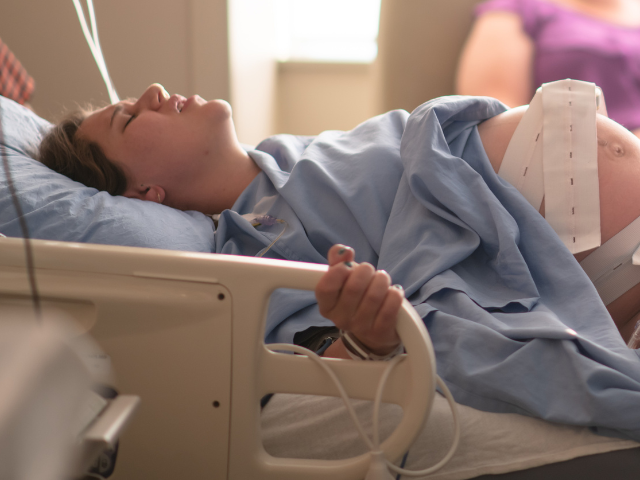‘I am so Tired; I Can’t do This’
Rewind to 2022, when I delivered my first baby.
During one of my last obstetrical (OB) appointments around 38 weeks, my cervical exam showed I was already dilated to 4 centimeters (I had no idea, and I did not feel anything), and my blood pressure started trending up. The OB doctor discussed induction at 39 weeks to prevent preeclampsia. My husband and I discussed the risks and benefits and decided to proceed with the induction.
A few days later, we woke up around 5 in the morning to head to the hospital, check in and get things started for the induction. Things were going pretty smoothly. As time progressed, with the Pitocin running, I began to feel the contractions more, and it was just too much. I decided to get an epidural. I signed the consent form, and the anesthesiologist came to insert it. Shortly after I received my epidural and the OB ruptured the membrane, my baby boy started to experience deceleration.
The nurses had me turn to my left side, gave me oxygen, and then had me get on my hands and knees on the bed. Thankfully, after all these interventions, the baby boy’s heart rate increased and was steady. After some time, it was time to start pushing, and, boy, did I push. I was pushing on and off for about three hours. It was rough, and I had moments of thinking and telling my husband, “I am so tired; I can’t do this.” However, with the support of my husband, the nurse, the OB doctor, and, of course, my fabulous body, I was able to push out our beautiful baby boy. I remember they put him on my chest, and I started crying and stimulating him as I held him. Leave it to the NICU nurse in me to make sure my baby would have a good transition.
Moved to the Operating Room
Unfortunately, during labor and pushing, I tore significantly. The placenta was delivered after the baby and the OB doctor began to stitch me up. The baby was taken to the warmer to obtain his weight, measurements, and vitals while the OB doctor was with me. Again, I had a significant number of tears, and the OB doctor was working on me, and it was excruciating. While all this was happening, my husband was texting our immediate families to let them know that our baby boy was delivered and that both the baby and I were doing well. Shortly after this, things took a turn for the worse.
The OB started saying that it was hard to visualize anything because I would not stop bleeding. She ordered the nurses to give me some medications for hemorrhaging, but they did not work. I continued to bleed out significantly. The OB told us she wasn’t able to stop the bleeding and that she needed to take me to the operating room to numb me using the epidural (thank goodness I had this), so she could see what was going on. I remember her saying it could be a piece of the placenta left behind (but she didn’t think it was), or I have tears that are higher up and hard to visualize. It was all such a blur. I signed the consent form as they were preparing to roll me out. As they rolled me out, I said, “I love you,” to my husband, watching him with tears in his eyes and looking at my baby in the warmer. I started praying that I would be okay so I could go back to my baby and husband.
I remember when we arrived at the operating room, they transferred me to the operating table, and started two more peripheral IVs and a bunch of fluids. The anesthesiologist administered medication via my epidural. I almost instantly felt numb again in the bottom of my body. While the OB was figuring out what was going on, I remember feeling scared, but I kept making myself look at the monitor to check my vitals. One of the IVs started hurting, and I told a nurse. It hadn’t gone well, so they removed it. After some time, the OB said it was a tear that was higher up that just kept bleeding, so it made was hard for her to visualize while we were in the delivery room earlier.
She told me if I hadn’t been in the hospital when all this happened, my outcome would have been significantly different. At this time, I asked one of the nurses if they could update my husband, so he knew I was okay. After this was over, my husband told me that when they rolled me to the OR, he was in the delivery room with our baby and vast amounts of blood on the floor from when I was hemorrhaging. Thankfully, they moved him and the baby to another room, where I was brought to recover.









